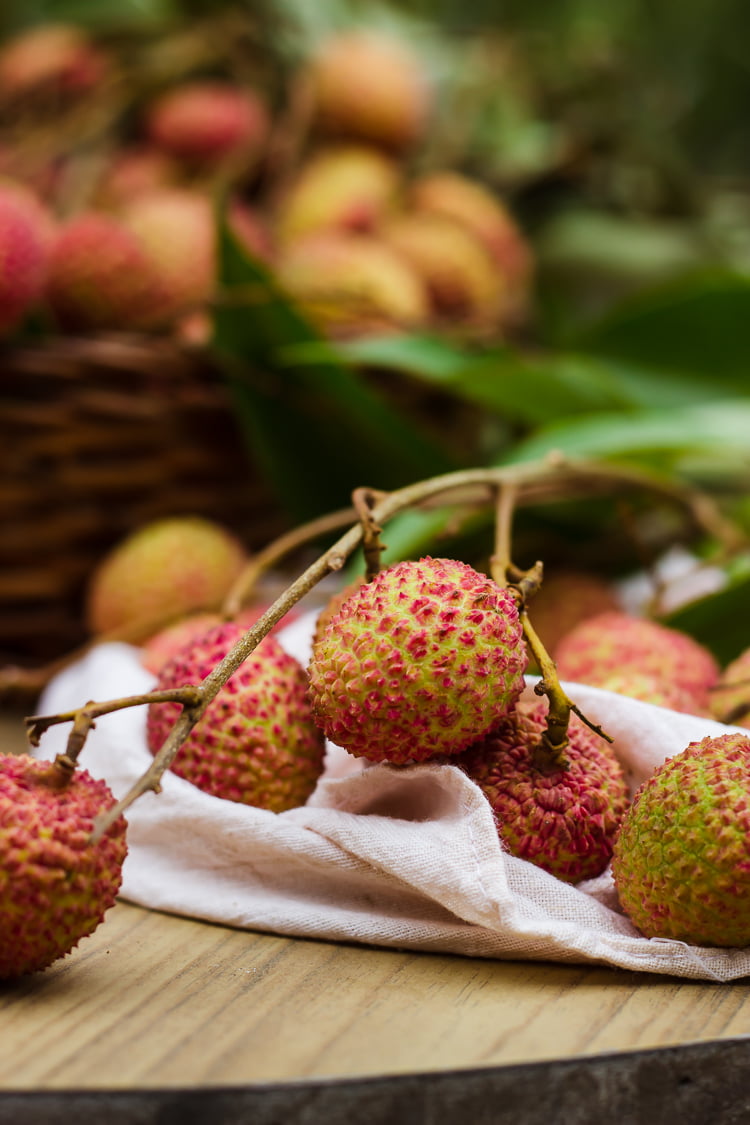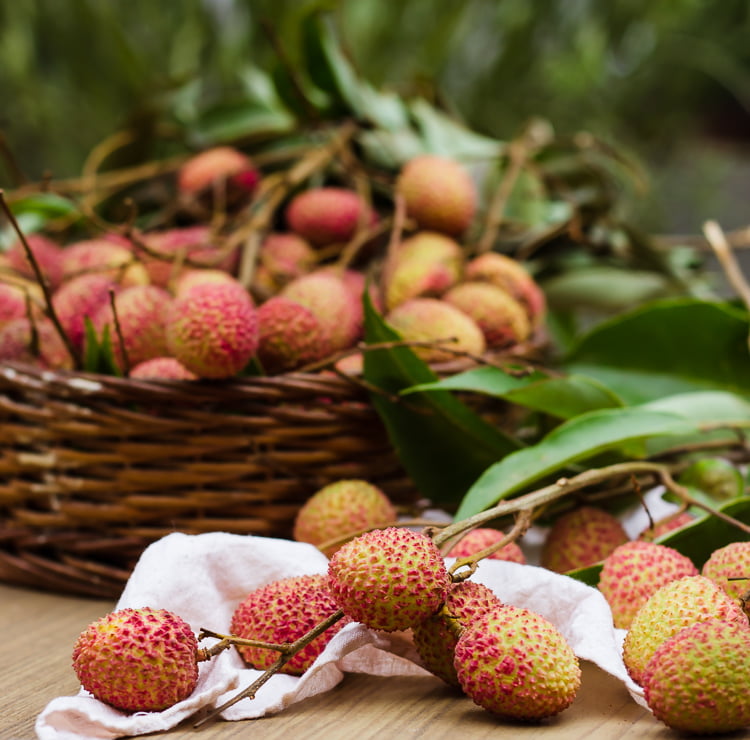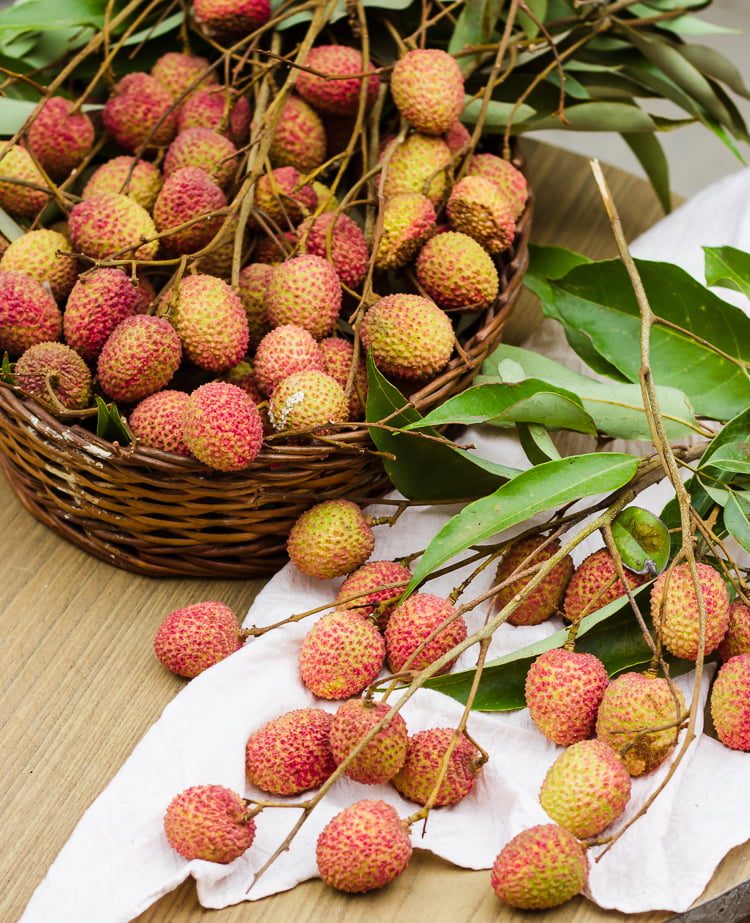When I am asked what is my favorite fruit, my answer is always – Litchis (Lychees) and Grapes. And I get to indulge in both of them when I am visiting home.
Homegrown and organic produce is THE rage these days. And should be justifiably so and probably even more emphatically. With the growing concern about the use of chemicals, fertilizers & pesticides in our crops including artificial means to ripen fruits & vegetables and adulterated groceries, it is time may be to go back to our roots and harvest our own food.
In today’s lifestyle and space limitations of apartments, we are not able to maintain lavish kitchen gardens but I believe starting somewhere is good.
Always with immense satisfaction, I eat home-grown produce, and when that produce includes fruits like Grapes, Kala Jamun, Mango or Litchis then, the experience doubles and trebles. As a child, I have grown up on so many home-grown fruits and vegetables that today eating mandi bought produce is never that good. One always feels that this mango is too big or too early to be naturally produced or such things for other fruits as well.
These fruits bring me some more bittersweet memories to indulge in each year. They add to the love I feel for my place and the sense of belongingness I seek. There is no bigger blessing than being able to enjoy fresh produce in today’s day and age.
How does Lichi look?
Litchi fruit is round to oval in shape and has a rough sandpapered texture upon touch. A ripe litchi is pink to red in color. Once peeled, the interior of the fruit is whitish, semi-transparent (or murkish), and juicy. Each fruit carries one shiny, dark brown seed. It is grown on an evergreen tree.
What is the best season to eat litchis?
Lychees are typically in season from May to June, just before rainfall begins in northern states of India.
How to pick up a good lychee?
Lychees with bright red skin and fresh looking should be chosen. The rough outer covering should slide a little when pressed – this indicates it’s a perfectly ripe stage. But if it’s too soft then chances are that it’s overripe. The fruit which has a floral smell should be selected to eat.
What are the benefits of eating litchis?
Lychee offers multiple health benefits including goodness for skin to improved immunity. It is rich in vitamin C, vitamin D, magnesium, riboflavin, copper, phosphorus, and water. It promotes weight loss as it is full of fibre and has high water content. Vitamin C found in lychees improves skin health and prevents the signs of aging. Antioxidants present in it are helpful in fighting oxidative stress.
Eating litchi is known to boost immunity due to vitamin C – which is a great immunity booster. This delicious fruit contains potassium which is necessary to regulate blood pressure.
Fibre-rich lychee helps in regulating bowel movements and aids digestion. It is useful in the prevention of common digestive issues like constipation.
Which country has the best lychee?
Lychees are commonly grown in southern China, Taiwan, Vietnam, and the rest of tropical Southeast Asia, the Indian Subcontinent, and in tropical regions of many other countries. They thrive in a tropical climate that is frost-free and the temperature doesn’t fall below −4 °C (25 °F).
What is the best time to eat litchis?
Litchis should be eaten after breakfast or lunch during the season. Lychees should be properly ripe when eaten. It should not be consumed on an empty stomach or when they are unripened. Studies have shown that when lychees were consumed on empty stomachs by impoverished children of some Indian states, they experienced severe vomiting, and a drop in blood sugar which in some cases led to coma or even death.
What is the best way to eat lychee?
Lychee is largely enjoyed fresh and raw on its own. It also makes for a great addition to fruit salads, sauces, desserts, and beverages.
Ayurvedic View on Litchis
As per Ayurveda one should not combine milk with citrus or acidic food. Fruits rich in Vitamin C are citric and should not be combined with milk. Lychees are rich in Vit C & hence they should also not be mixed with milk for consumption. It is believed that milk takes longer to digest and stays in the stomach for a longer duration. When milk and citrus fruit are mixed together the milk coagulates which can lead to gas and heartburn.
How long do litchis last?
Lychee is a highly perishable fruit and lasts for only 2-3 days at room temperature. It should be eaten fresh from the trees as soon as they are plucked.
For longer shelf life, you can keep litchi refrigerated. Lychees fast lose moisture, so it is always recommended to keep them moist by spraying them with water regularly. This helps in maintaining their skin color.
Amazing Facts
Lychee is known as the ‘queen of fruits’ as it is packed with nutrients.
In English, litchi stands for ‘gift for loyal life’ – with its ample health benefits, it is a very apt name.
The dark brown seed inside the whitish translucent flesh of litchi is actually harmful to the digestive system and should not be consumed.
Lychees are a delicious and nutritious fruit, but like all foods, they should be consumed in moderation. It is generally recommended to consume 6-10 lychees per day. This provides a good amount of vitamins and minerals without excessive sugar intake.
Lychee Syndrome:
In rare cases, particularly in undernourished children, consuming large quantities of lychees on an empty stomach has been linked to hypoglycemia (dangerously low blood sugar levels). This is due to the presence of certain natural toxins in unripe lychees.
Conclusion
Eating 6-10 lychees per day is a reasonable amount for most people to enjoy the health benefits without overconsuming sugars and calories. As with all fruits, it’s best to eat lychees as part of a balanced diet that includes a variety of other fruits and vegetables. If you have any health conditions or dietary concerns, it’s always a good idea to consult with a healthcare professional for personalized advice.
Lychees can be a beneficial addition to a weight loss diet due to their nutritional profile and some specific attributes. Here are some reasons why lychees might be good for weight loss:
Benefits of Lychees for Weight Loss
Low in Calories:
Lychees are relatively low in calories. A typical lychee contains about 6-7 calories, making them a low-calorie snack option.
High Water Content:
Lychees have a high water content, which can help keep you hydrated and feeling full, potentially reducing overall calorie intake.
Rich in Fiber:
The dietary fiber in lychees aids in digestion and promotes a feeling of fullness, which can help curb overeating and snacking between meals.
Nutrient Dense:
Lychees are rich in vitamins and minerals, including vitamin C, vitamin B6, niacin, riboflavin, folate, copper, potassium, phosphorus, magnesium, and manganese. These nutrients support overall health and metabolism.
Antioxidant Properties:
The antioxidants in lychees, such as vitamin C, help combat oxidative stress and inflammation, which can support overall health and weight management.
Natural Sweetness:
Lychees are naturally sweet, making them a satisfying alternative to sugary snacks and desserts. This can help reduce overall sugar consumption and support weight loss efforts.
Considerations
Moderation is Key:
While lychees are low in calories and high in nutrients, they do contain natural sugars. It’s important to consume them in moderation to avoid excessive sugar intake.
Balanced Diet:
Lychees should be part of a balanced diet that includes a variety of fruits, vegetables, lean proteins, and whole grains. Relying solely on lychees for weight loss is not advisable.
Pairing with Other Foods:
For a more balanced snack, consider pairing lychees with a source of protein or healthy fats, such as nuts or yogurt. This can help stabilize blood sugar levels and keep you feeling full longer.
Conclusion
Lychees can be a good addition to a weight loss diet due to their low calorie and high fiber content, along with their richness in vitamins and antioxidants. However, they should be consumed in moderation and as part of a balanced, varied diet. If you have specific dietary concerns or health conditions, it’s always a good idea to consult with a healthcare professional or a dietitian for personalized advice.






